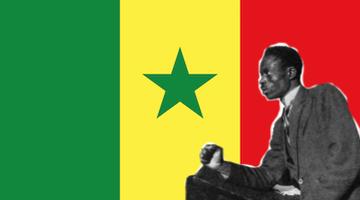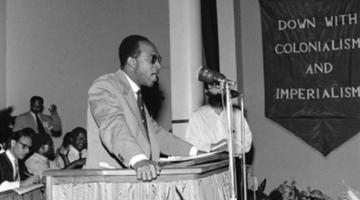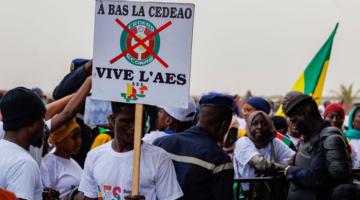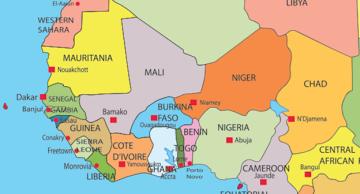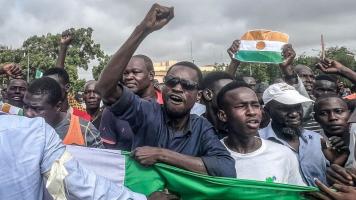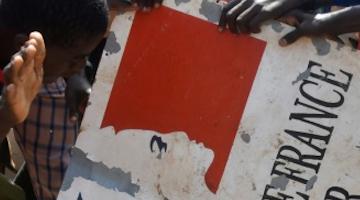In this series, we ask acclaimed authors to answer five questions about their book. This week’s featured author is Maboula Soumahoro. Soumahoro is Associate Professor in the English department of the University of Tours. Her book is Black is the Journey, Africana the Name.
Roberto Sirvent: How can your book help BAR readers understand the current political and social climate?
Maboula Soumahoro: I think my book can serve as an introduction to contemporary hexagonal French matters to be placed in the larger context of matters pertaining to the African Diaspora, imperialism and post-imperialism. Indeed, it comes from a singular perspective – mine, that is to say a black woman of Ivorian/African descent who was born and raised in Paris, France, before traveling extensively throughout and studying, researching and teaching the Black Atlantic. I have an intimate connection to my area of study, which is not merely an object of study. It is rather my life and experience.
All that to say, that BAR readers may be able to find in my text information about the particular context of post-colonial and Hexagonal France, particularly in the nation’s treatment of its colonial and slave pasts, along with the repercussions of this past on its contemporary inhabitants, whether those be favorably or unfavorably racialized.
As such, for BAR readers, located in the United States or other areas of the world, it may be possible to make the necessary connections between the macro and micro analyses and therefore get a clearer view of global phenomena. Indeed, these global phenomena, precisely, are fed by individual, local, national processes. I am simply contributing one story to the global conversation around race and blackness, history and lived experiences, class, gender, nationalism, internationalism, transnationalism and diaspora.
What do you hope activists and community organizers will take away from reading your book?
I am hoping that activists and community organizers will come across a book that is accessible in its very language. Because my initial approach of the book was that it should be redacted in a language and form that should not exclude. As such the ambition of the book was to put the theory in practice. The form had to be a satisfying reflection of the content. In that, the book refrains from using academic jargon, for instance, and hopes to adopt – not a simpler way of stating things – a writing style that leaves room for nuanced and complex issues without the authoritative language of academia. This is the reason why, to a certain extent, I view this book as a work of translation. Indeed, it seeks to translate academic works so as to enlighten, to make sense of lived human experiences impacted by the social, political, economic, historical developments that have shaped the Western world in the past centuries.
Activists and community organizers, therefore, may be able to use this book as a primary source, as a tool that they can use in any manner they may see fit. In my view, narratives and self-narratives do hold great significance precisely as they can undergird a sense of belonging and community, whatever the type.
We know readers will learn a lot from your book, but what do you hope readers will un-learn? In other words, is there a particular ideology you’re hoping to dismantle?
I think this answer will be the one I might be the most passionate about! I do have at heart the wish that readers will un-learn the myth of French color-blindness and universalism. That matters even more in the context of the United States as hexagonal France has had a long history of warmly welcoming and sometimes excellent treatment of African American and Afro-diasporic individuals. Josephine Baker was admitted to the French Pantheon just last year! Baker is one of the few women to have been admitted into this national temple of recognition. That alone constitutes perhaps one of the highest honors to be bestowed on a citizen by France. Beyond this fact, Baker is the first woman of color to have entered the Pantheon. Such a level of distinction is so interesting and revealing to me in that it sheds light, in my view, on the long-standing history of silencing and erasure of French populations, communities, and individuals of colors that are part of the French nation. Proclaiming herself as color-blind makes France able to deny, reject, and recant her very own blackness. I genuinely hope that readers unfamiliar with French matters will learn that France is – like so many other countries in the West – part and parcel of this global phenomenon of racializing that exists to this day. France is no exception and has not been left untouched by the history of racism, neither in her past not her present.
Which intellectuals and/or intellectual movements most inspire your work?
A lot of the people who inspire me are mentioned in the book, so readers will need to read the book to discover them! But I can say that there is a wide array of people and movements, from different sites of the Black Atlantic, from different time periods, and in a variety of disciplines and categories: thinkers, activists, politicians, spiritual leaders, writers, feminists, artists, including, rappers, directors, musicians. Just a lot of people and movements!
Which two books published in the last five years would you recommend to BAR readers? How do you envision engaging these titles in your future work?
Even though I have read those two novels in the last five years, I understand that they were published a little over the five-year limit you impose: Yaa Gyasi’s Homegoing 2016) and Marlon James’ A Brief History of Seven Killings (2014). These are two books that I have not only loved and greatly appreciated, but they are also works that have inspired and stimulated me to tell stories about history in a different way. In the case of Yaa Gyasi, the history she explores takes us back century, but the book ends with the present times. How do today’s people live their actual lives in light of such a legacy? That is the existential question that has increasingly interested me. Again, the issue is that of translation: how does the acquired historical knowledge may help us stand in the present. This cannot be solely about data, archives and the collection of facts from the past, it can also be about the translation of this past in the present. And this translation is also what lures me to other forms of expression that take me outside of strictly defined academic disciplines and their irrelevant borders. This is the reason why I have loved the way Marlon James has played with the figure of and mythology around Bob Marley to write a recent history of Jamaica. In doing so, the reader gained access to politics, geopolitics, music and the arts, the process of writing (both a story and history), languages and linguistics, history and geographies, constantly moving between the macro and micro level. So much is condensed in just one novel, so many disciplines are combined, so much truth and beauty are thus woven together. What a feat!
Lastly, Steve McQueen’s Small Axe (2021), a body of filmic work made of 5 “chapters”, is the piece of work that I have engaged the most with lately. Probably because the work is everything at the same time: visual, sonic, historical, sociological, political, personal and intimate. I have loved how the son of Caribbean migrants, born and raised in mainland United Kingdom has allowed himself to fully accept and explore his anchorage in the land that is not that of his parents. Beyond the story and history of migration - the parents’ experience, what are the story and history to be told about the children, the first generation born “elsewhere”. I am first generation French, of Ivorian ancestry, always on the lookout for stories, histories, all types narratives exploring this experience from within. By any form necessary. Because the time has now arrived.
Roberto Sirvent is editor of the Black Agenda Report Book Forum.

